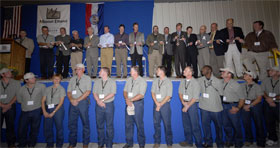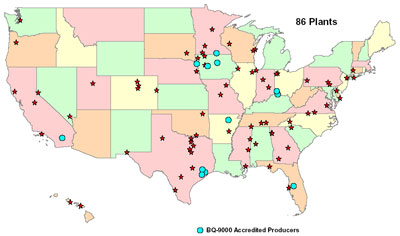
 MGP Ingredients Inc. and Bunge North America are considering jointly building an ethanol plant in the Atchison, KS area, according to a Kansas City Business Journal report.
MGP Ingredients Inc. and Bunge North America are considering jointly building an ethanol plant in the Atchison, KS area, according to a Kansas City Business Journal report.
In a filing Thursday with the Securities and Exchange Commission, Atchison-based MGP Ingredients said the companies have made no decisions to proceed beyond the investigatory stage.
In other Bunge news this week, the St. Louis-based agribusiness corporation announced it is teaming up with Memphis-based Biodiesel Investment Group, LLC to build Illinois’ largest biodiesel plant in Danville.
Plans are for the joint venture, Biofuels Company of America, LLC to build the 45-million gallon per year biodiesel plant adjacent to Bunge’s soybean processing facility in Danville, Ill. Work on the site is already under way with plans for the plant to be operational in the first quarter of 2008.
 The grand opening event for Missouri Ethanol is just finishing up with public tours. I don’t think they could have asked for better weather. I heard the attendence pegged at 585 but I think it was more than that. It was a big crowd on hand.
The grand opening event for Missouri Ethanol is just finishing up with public tours. I don’t think they could have asked for better weather. I heard the attendence pegged at 585 but I think it was more than that. It was a big crowd on hand.

 The
The  While
While  Training on how to finance biofuels projects is the goal of
Training on how to finance biofuels projects is the goal of  I was very pleasantly surprised to see the price of gas in Columbia, MO yesterday.
I was very pleasantly surprised to see the price of gas in Columbia, MO yesterday. 
 As the biodiesel industry continues to grow, the
As the biodiesel industry continues to grow, the 

 We really try to stay away from politics here on Domestic Fuel but sometimes you just have to say something. Actually this picture which I found on
We really try to stay away from politics here on Domestic Fuel but sometimes you just have to say something. Actually this picture which I found on 